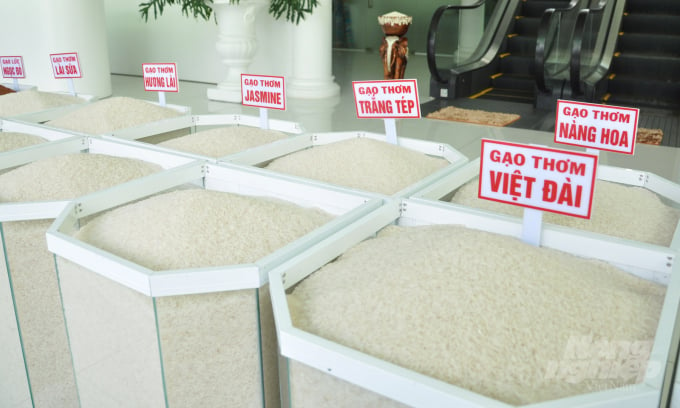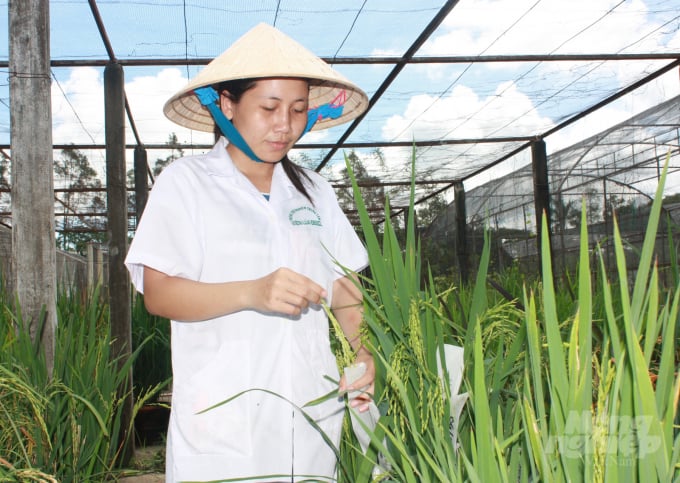May 21, 2025 | 06:20 GMT +7
May 21, 2025 | 06:20 GMT +7
Hotline: 0913.378.918
May 21, 2025 | 06:20 GMT +7
Hotline: 0913.378.918

Photo shows types of high-quality Vietnamese rice. Photo: HD.
The move came after agricultural scientists warned that rice production in the Mekong Delta provinces had face new challenges while Viet Nam has deeply integrated with the international area, climate change showed extreme developments and scale of rice production had been still small.
Especially, two provinces of Soc Trang and Bac Lieu have deployed the farming model of "fragrant rice - clean shrimp".
As a result, rice varieties of ST24 and ST25 have become the best rice in the world with high export value. Then, the local farmers also selected the two rice varieties to widely grow in their field.
It is estimated that up to 200,000 ha have been farmed under rice-shrimp rotation model in coastal provinces of Bac Lieu, Soc Trang, Ca Mau and Kien Giang so far.
The number is three times higher than in 2000.
Le Thanh Tung, deputy head of the Crop Production Department under the Ministry of Agriculture and Rural Development, said there was a clear shift in the selection of rice varieties to grow in the delta to meet the market demand since 2000.
Tung said many localities in the delta reduced growing rice varieties with medium-quality rice in order to shift to grow high-quality rice varieties.
The number of specialty fragrant rice had increased from 25 per cent to 30-40 per cent over the past ten years, he added.
Besides, high-quality rice varieties to serve the export market accounted for 30-45 per cent, he said.
Rice production in the delta has been developed for a long journey with many difficulties and challenges for many decades.
After the year of 1975, the Mekong Delta Rice Institute was established. The institute was tasked to conduct researches on rice to exploit the advantages of the delta, ensure food security for the country and serve rice export.
The hybrid rice varieties that were introduced by the institute during 1982-1990 immediately addressed food security goals of the whole country.

A woman researches on OM rice breeding in the Mekong Delta Rice Institute. Photo: VL.
Twelve years after the establishment of the institute, the rice variety named OM was officially created, bringing a premise for building a solid foundation for rice production in the coming years.
Then, the yield of rice has been constantly increasing. Viet Nam then integrated into the rice export market, on par with the world's leading rice-production countries.
In the period 2000-2010, a group of high-quality rice varieties and a mild-fragrant rice variety were introduced to meet demand of the market. Some new rice varieties with high-nutrient value and high vitamin were created. The area of growing rice had been increasing in the delta.
Tung said this was time to change the quality of rice for export. The institute spent at least 5 years to improve the length of the grain and at least 10 years to improve the amylose content of rice. The rice OM3536 was delicious and fragrant while the sticky rice OM85 in provinces of Long An and Tien Giang mainly grew for export.
Also at the period, businesses strongly engaged in researching and selecting rice varieties such as Vinaseed, Loc Troi Group and Thai Binh Seed to meet the demand for domestic consumption as well as export.
Many individuals such as engineer Ho Quang Cua and a group of scientists created a set of special fragrant rice varieties named ST (ST24, ST25...); engineer Le Hung Lan created the rice variety named Nang Hoa 9.
A number of joint venture companies imported round-grain rice varieties such as Japonica variety.
The varieties have enriched the supply market of rice varieties for production, meeting the demand on rice in each market segment.
For future plans, scientists of the Mekong Delta Rice Institute said that they would introduce new rice varieties with high quality in the next 10 years.
Research on the new rice varieties would be conducted with supports of the Viet Nam Food Administration to meet each segment of rice in the market.
The scientists would also restore some local specialty rice varieties to set up specialised-rice growing areas.
The scientists suggested that Viet Nam should participate in the market segment of high-end delicious rice and accept to compete with some countries that participated in the segment for a long time.
Because, the market segment for the high-end delicious rice was not large, but the value of the rice was high, they said.
Translated by Thu Hang

(VAN) Dong Thap farmers attained an average profit margin of 64% during the summer-autumn 2024 crop (first season), while An Giang and Kien Giang farmers followed with 56% and 54%, respectively.

(VAN) As a doctoral student doing research on renewable energy and electrification at Harvard University, the author shares his musings on electricity, nature, and countryside memories.

(VAN) The decree on Extended Producer Responsibility (EPR) ensures transparent management and disbursement of support funds, avoiding the creation of a “give-and-take” mechanism.

(VAN) Hue City rigorously enforces regulations regarding marine fishing and resource exploitation, with a particular emphasis on the monitoring of fishing vessels to prevent illegal, unreported, and unregulated (IUU) fishing.

(VAN) Hanoi People's Committee has issued a plan on reducing greenhouse gas emissions in the waste management sector with 2030 vision.

(VAN) Vietnam's draft amendment to Decree No. 156 proposes a mechanism for medicinal herb farming under forest canopies, linking economic development to population retention and the sustainable protection and development of forests.

(VAN) In reality, many craft village models combined with tourism in Son La have proven effective, bringing significant economic benefits to rural communities.